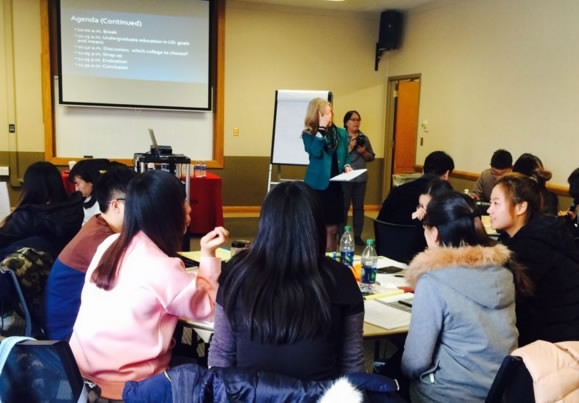
Culture
17:57, 20-Dec-2017
Study abroad agencies on the rise in China as students seek global education
By Ryan Chua

With deadlines just around the corner, the last two months of 2017 have been a frantic time for Zhang Zekun, who's applying to 10 universities in the US.
Every Thursday, he attends a review class for the Graduate Management Admission Test (GMAT). He is also working on his essays and other admission requirements.
"I want to go abroad to see a different culture in one of the most developed countries in the world," said Zhang, a math major. "I also want to study another course."
Zhang has been preparing to apply to graduate school for more than a year now, reviewing for standardized tests and getting advice from overseas study consultants.
Lucrative sector
As more and more Chinese seek an education abroad, companies that help them with their applications have become a fast-growing and lucrative sector in China.
Study abroad agencies offer various services, from helping students pick the right schools and programs based on their qualifications to improving their application essays. And their services don't come cheap.

Photo via sohu.com
Photo via sohu.com
At New Oriental Education and Technology Group, a New York Stock Exchange-listed company, overseas study consulting costs an average of 30,000 yuan or around 4,500 US dollars. The amount does not include test reviews, which the company offers separately.
"We select the information for you, send the information to you, do a very accurate profiling of you academically, socially, your interests, what areas you lack, and what can we do to fill the gaps," said Chen Zhuang, New Oriental's director for international cooperation.
In 2016, New Oriental's study abroad consultancy Vision Overseas was its second largest income earner, generating more than 1 billion yuan (or 150 million US dollars) in revenue - a record high for the company.
From having just two offices in 2008, Chen said Vision Overseas now has 42 branches in different parts of China. It currently serves more than 40,000 clients.
"I think many families and many parents can afford to send their children to study abroad to enrich their life learning, and also to expand their horizon and employment possibilities," said Chen.
Growing trend
According to China's education ministry, 544,500 Chinese went abroad for their studies in 2016, more than triple the number eight years earlier. The numbers are expected to soar in the coming years as family incomes rise and an overseas education is increasingly seen as a ticket to success in a competitive job market.
Even smaller agencies are cashing in on the growing trend. Better Education, a Guangzhou-based company, earned more than 3 million US dollars last year.

Photo via sohu.com
Photo via sohu.com
"When we established our company in 2010, we had only 50 students. But now we are serving about 1,000 students," said Robert Pang, the company's service director.
Better Education offers overseas study counseling for 20,000 to 50,000 yuan, Pang said, depending on a student's needs and the prestige of the school he or she is applying to.
"The most important reason is to increase their chances to be admitted by top schools," Pang said. "By providing high-quality essay writing, background enhancement, and interview guidance, you can help them increase their chances to be admitted."
Preventing fraud
Beginning this year, the central government stopped requiring agencies to secure licenses from provincial education bureaus, making it easier for new players to enter the market. But it has also become harder to ensure agencies provide quality service and do not commit fraud, according to the nonprofit Beijing Overseas Study Service Association (BOSSA).

Photo via sohu.com
Photo via sohu.com
In recent years there have been accusations of consultants helping students cheat on their applications. In 2016, Reuters reported that Shanghai-based Dipont Education Management Group was accused by ex-employees of not only writing essays and recommendation letters for students, but also paying admissions officers at top US universities in cash and other perks to help its clients.
Without government regulation, BOSSA has stepped in to help prevent fraud and protect customers, said Sang Peng, the group's president.
To be accredited by the group, agencies have to meet certain standards.
"Those who commit fraud and violate our principles and standards will be sanctioned, and we'll publicize what they did," he said. "Our goal is deterrence. If they lose their credibility in this market, they lose their credibility elsewhere."
BOSSA has set up a system to help institutions abroad verify applicants’academic records. It also has a training program for education agents and a hotline for customer complaints.
But BOSSA holds sway only over its 220 members—a tiny fraction of an estimated 4,000 agencies operating across China and fueled by an ever-growing demand.

SITEMAP
Copyright © 2018 CGTN. Beijing ICP prepared NO.16065310-3
Copyright © 2018 CGTN. Beijing ICP prepared NO.16065310-3